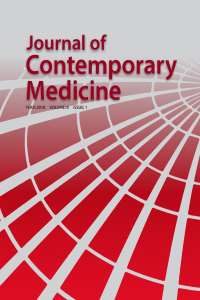Travmatik Beyin Hasarı ile Konturlateral Sensorinöral İşitme Kaybı
Travmatik beyin hasarı (TBH) tüm dünyada ölüm ve sakatlığın en önemli nedenidir. İşitme kaybı için kafa travması ve farklı lezyonları içeren birçok neden vardır. Literatürde kontur kup kafa travması sonrası oluşan konturlateral serebral kontüzyonel hematomla oluşan konturlateral işitme kaybı ile ilgili bir çalışma bulunmamaktadır. Biz kafa travması geçiren ve Glasgow koma skoru (15) olan bir hastayı takdim ettik. Hastanın labirentin hasarı olmaksızın sol sensori-nöral işitme kaybı mevcuttu. Bilgisayarlı tomografi (BT) sağ temporal kemik kırığını ve konturkup kafa travması ile oluşmuş sol temporal parankimal hematomu gösterdi. Bu hastaya medikal tedavi uygulandı ve semptomlarında bir ay sonra düzelme saptandı. TBH nedeniyle oluşan işitme kaybı iyi bilinen bir durumdur. İpsilateral temporal kemik kırığı genellikle sensorinöral işitme kaybı ile ilişkilidir. Literatürde çok az sayıda konturlateral labirentin konküzyonlar ve bir ekstradural hematom edinilmiş konturlateral sağırlığın mekanizması olarak gösterilmiştir. Bizim vakamız TBH ile oluşan konturlateral sağırlığın, temporal kemik kırığının yokluğu ve konturlateral intraserebral kontüzyonel hematomun varlığı ile oluşan nadir bir sunumudur.
Anahtar Kelimeler:
İşitme kaybı, kafa travması
Traumatic Brain Injury with Contralateral Sensorineural Hearing Loss
Traumatic brain injury (TBI) is major cause of death and disability worldwide. There are a great number of causes for hearing loss which include head trauma and different lesions. There is no study regarding contralateral sensorineural hearing loss following contrecoup head injury with contralateral cerebral contusional hematoma, exist in the literature. We presented a patient who had a Glasgow coma score (GCS) of 15 as suffering from head trauma. The patient had left sensory-neural hearing loss without labyrinthine damage. Computerized tomography (CT) showed right temporal bone fracture and left temporal parenchymal hematoma caused by contra-coup head injury. This patient required medical management and showed remission of symptoms after one month. Hearing loss due to TBI, is a well known entity. Ipsilateral temporal bone fracture is commonly associated with sensorineural hearing loss. A few contralateral labyrinthine concussions and an extradural hematoma are shown as the mechanisms of contralateral profound deafness in the literature. Our case illustrated unusual presentation of contralateral deafness following TBI in the absence of temporal bone fractures and in the presence of contralateral intracerebral contusional hematoma.
Keywords:
Hearing loss, head trauma,
- Yayın Aralığı: Yılda 6 Sayı
- Başlangıç: 2011
- Yayıncı: Rabia YILMAZ
Sayıdaki Diğer Makaleler
Travmatik Beyin Hasarı ile Konturlateral Sensorinöral İşitme Kaybı
Septik Pulmoner Emboli, Olgu Sunumu
Fulsen Bozkus, Nursel Dikmen, Nurhan Atilla, Hüseyin Arpağ, Hasan Kahraman
Nadir bir akut batın nedeni : Yersinia Enterocolitica'ya bağlı mezenterik lenfadeni
Akut Göğüs Ağrısının Alışılmadık Bir Nedeni: Öksürüğe Bağlı Kosta ve Skapula Kırığı
Alile Baskısı nedeniyle durdurulan transplantasyon olgusunun etik analizi
Masif Hemoptizi Etyolojisinde Nekrotizan Pnömoni: Olgu sunumu
Mustafa ALTAY, Mehmet ÇÖLBAY, Metin ARSLAN
Lazer Çeşitleri ve yüksek yoğunluklu lazer kullanımı
